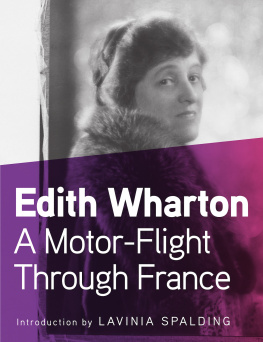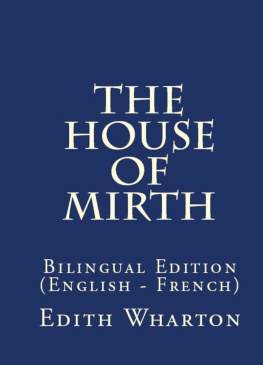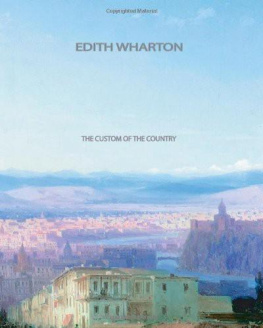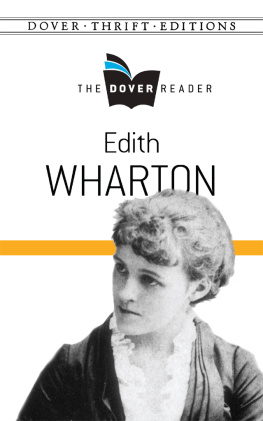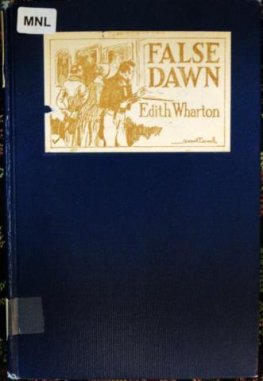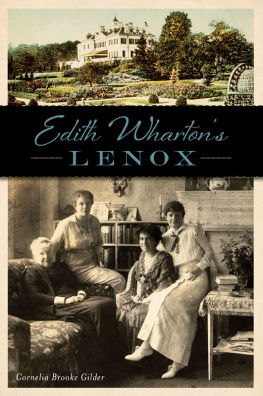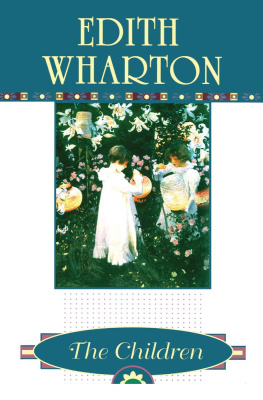Other Books by Edith Wharton
The Age of Innocence
The Children
The Custom of the Country
Ethan Frome
The Ghost Stories of Edith Wharton
The Glimpses of the Moon
The House of Mirth
Madame de Treymes and Three Novellas
The Mothers Recompense
Old New York
The Reef
Roman Fever and Other Stories
Summer
Twilight Sleep
The Writing of Fiction
A BACKWARD
GLANCE
byEDITH WHARTON
A TOUCHSTONE BOOK
Published by Simon & Schuster
Je veux remonter le penchant de mes belles annes
CHATEAUBRIAND: Mmoires dOutre Tombe
Kein Genuss ist vorbergehend.
GOETHE: Wilhelm Meister
TOUCHSTONE
Rockefeller Center
1230 Avenue of the Americas
New York, NY 10020
www.SimonandSchuster.com
Copyright 1933, 1934 by The Curtis Publishing Co.
Renewal copyright 1961, 1962 by William R. Tyler
Introduction copyright 1964 by Charles Scribners Sons
All rights reserved, including the right of reproduction in whole or in part in any form.
First Touchstone Edition 1998
T OUCHSTONE and colophon are registered trademarks of Simon & Schuster Inc.
Manufactured in the United States of America
7 9 10 8 6
Library of Congress Cataloging-in-Publication Data is available.
ISBN-13: 978-0-684-84755-9
ISBN-10: 0-684-84755-8
eISBN: 978-1-439-10505-4
TO THE FRIENDS WHO EVERY YEAR ON A LL S OULS N IGHT COME AND SIT WITH ME BY THE FIRE
INTRODUCTION
I T was said of Edith Wharton that she and Theodore Roosevelt were self-made men, and the saying pleased her. She and the president, contemporaries and good friends, had grown up together and escaped from the kind of society that was the hardest of all to escape from: the secure, complacent haute bourgeoisie of the late nineteenth century that found politics too dirty for gentlemen and letters too inky for ladies. She described the energizing effect of this kindly but always mocking world on Newland Archer in The Age of Innocence. We are shown how relentlessly it closes in on him, and how, at the end of a mild good life of minor accomplishments, he has nothing to demonstrate for it but the friendship of one great man who, unlike himself, got away to achieve the highest office in the land. Her own escape is rendered in these memoirs.
It is notable that literature was only a part of her self-making. Book jacket typing of Edith Wharton tends to depict her as the portrayer of a society of which she was a charter member, even a leader. Little is made of the fact that she developed herself by tireless industry into precisely the kind of woman who would have been most out of place in the New York of her early days. She might have been the model, in everything but deportment (where she was always scrupulously conventional) of all that a lady was not meant to be. In gardens and houses, where it was fashionable to be haphazard and cluttered, she was chaste, classical and historically sound. In the arts and letters with which it was appropriate to have a tepid flirtation, she had a life-long love affair. In history she was a scholar, in languages an expert, in travel a practiced guide. In short, her life was a revolution against the idea that a lady should be in everything a mere amateur. Mrs. Wharton was always determined to be surrounded with a beautiful world, even if she had to build it herself.
It is this that makes A Backward Glance such a uniquely interesting record. The prim little girl who hated the ugliness of New York in the seventies, that cramped horizontal gridiron of a town without towers, porticoes, fountains or perspectives, who was set back in her career by her marriage to a man who loved the social round, began to convert her European trips into the avenue to a new life. It took long years, but in the end she achieved every thing she wanted: two beautiful houses, near Paris and at Hyres, each with a perfect garden (the garden, Mrs. Winthrop Chanler tells us, was Ediths soul), a great literary reputation and a circle of intimate friends which included Henry James, Howard Sturgis, Berenson, Bourget, Vernon Lee, Geoffrey Scott and Percy Lubbock. She was one of the first to use the luxuries of a mechanical age to explore more excitingly the beauties of the old: the automobile to visit the glories of Spain and Italy, the steam yacht to scout the Mediterranean. What room was there for the second rate in books, pictures, flowers, excursions, meals, friends, when the first rate was there to be culled? To us today, accustomed to finding a crowd of tourists ahead of us at the rarest shrine, to the mediocrity of mass production in even the most expensive things and to an architectural world where all decoration and individuality is being replaced by glass cubes, the Europe of A Backward Glance seems as elegant as a Watteau drawing and Mrs. Whartons life a prodigy of good organization.
What was sacrificed to it? For surely we can console our poorer selves that something had to be. Well, Mr. Wharton, for one. That gentle unintellectual sportsman, whom Consuelo Balsan describes as more of an equerry than an equal, walking behind his wife and carrying whatever paraphernalia she happened to discard, could not survive in the rarefied atmosphere which nourished Paul Bourget and Walter Berry. He suffers a nervous breakdown and disappears, after a few references, from the pages of the memoirs. Mention is not even made of the fact that the author divorced him in 1913. Nor is mention made, except in Egerton Winthrops gentle reproach for her impatience with a waiter, of how much was expected of friends and servants in maintaining that well-ordered life. Mrs. Chanler, who deeply admired and loved Edith Wharton, nonetheless related to me how childishly her friend could resent any failure on the part of another to go through with a planned excursion, even when that failure was caused by domestic emergency, and Percy Lubbock records what state Mrs. Wharton insisted on keeping and how impossibly fussy she was in country hotels. One feels that the parlors of her memory, unlike those ever neat chambers in the famous anecdote about her early writing, had to be tidied up a bit.
But there again we come back to the point. Everything about Edith Wharton had to be tidy, even her memories. Mrs. Chanler was the same with her own. It was an era of restraint where people believed there were things to be shown and things not to be shown. How far we have gone in a different direction can be seen by a glance at the memoirs of Diana Barrymore and Caitlin Thomas. I confess to a partiality for the earlier method. We know from published bits of Mrs. Whartons private journal that she was bored and frustrated with her husbands philistinism and deeply in love with Walter Berry, yet it seems to me that both of these admittedly important facts become evident to the attentive reader of the memoirs in her sparse references to the one and her glowing tributes to the other. Had Mrs. Wharton baldly stated these things they would have thrown the picture of her life out of focus. They would have seemed more important than they were, particularly to American readers today, who take for granted that the key to a mans character is the least conventional aspect of his sex life, and who, as Mary McCarthy has said, find it increasingly difficult to understand any human relationship outside of love. But to Mrs. Wharton friendship, in the long run, was the steadier rock on which to base a life.
Next page

